In January, the Supreme Court announced that it would hear a case deciding whether race-conscious admissions programs at Harvard and the University of North Carolina are lawful. The plaintiffs argue that the universities discriminate against white and Asian applicants to give an admissions edge to Black, Hispanic, and Native American applicants. The universities deny discriminating against these groups and argue that race-conscious admissions policies are lawful, having previously been upheld by the Supreme Court.
A recent YouGov poll asked Americans their views on affirmative action, the importance of diversity in schools, and which factors colleges should consider in admissions decisions. The results suggest that Americans’ opinions on these topics are wide-ranging and at times contradictory. While most people agree that racial minorities are underrepresented and have historically lacked equal access to top universities, most also oppose race-conscious admissions and more people agree that affirmative action is a form of discrimination than disagree.
A roughly equal share of people say they support (35%) and oppose (36%) affirmative action in college admissions. People who have a college degree are more likely to support than to oppose affirmative action, while people without a degree are more likely to oppose it than to support it. While Black and Hispanic Americans are more likely to support affirmative action than to oppose it, white Americans are more likely to oppose it than support it.
However, support for affirmative action varied based on how the question was asked, and likely what assumptions or implications that wording carried with it. Below, we summarize the share of Americans who support and oppose various interpretations of affirmative action:
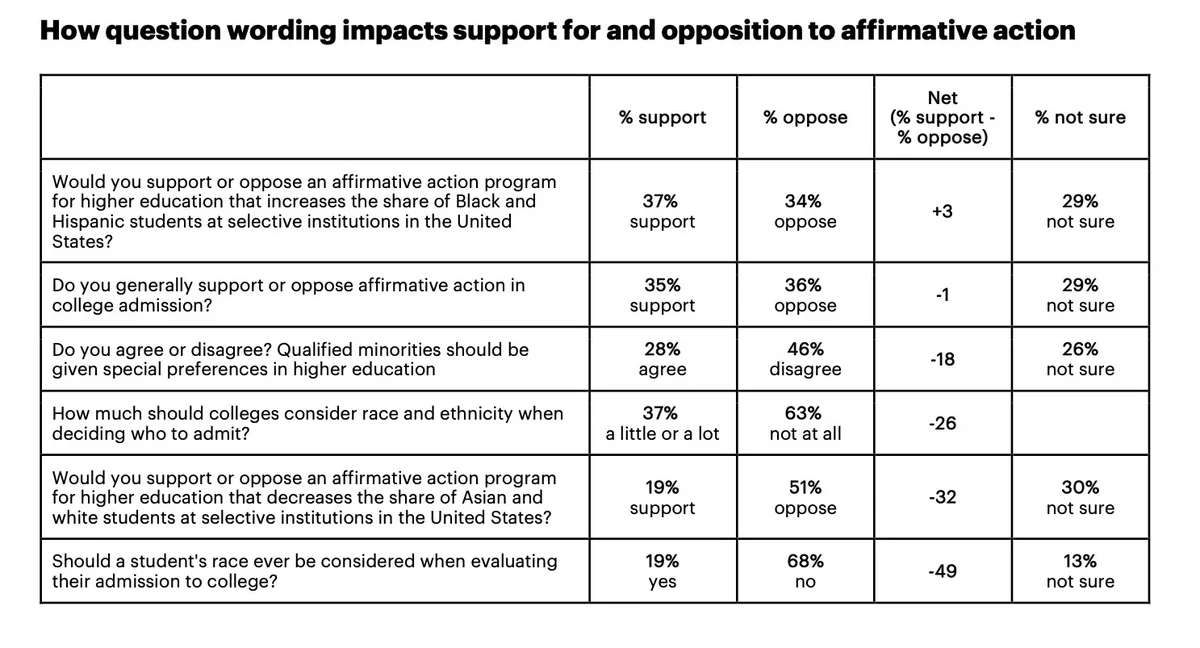
We also asked Americans whether they agree or disagree with a variety of statements relevant to affirmative action. Despite the drawbacks to agree/disagree-style questions, they are useful for comparing attitudes among different groups, and across different questions. The results, broken down by party, education, and race below, show that while most people acknowledge that Black Americans have historically been denied equal access to universities, far fewer think that affirmative action will right these injustices.
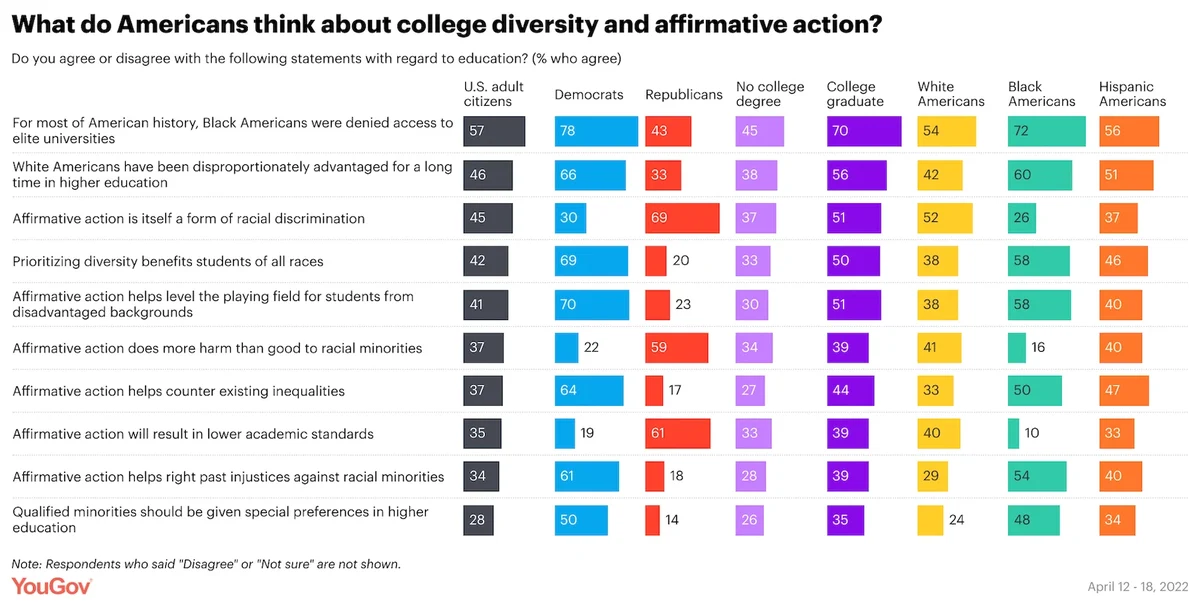
In an experiment, we asked half of the respondents their thoughts on an affirmative action program that would increase the share of Black and Hispanic students at selective colleges. The other half were asked how they felt about a program that would decrease the share of Asian and white students. Americans were 18 percentage points more supportive of programs described in terms of increases in the share of certain students (37% support) rather than programs described in terms of decreases (19% support).
The experiment only had a significant effect on people who already said they supported affirmative action in general in an earlier question. The effect among this group was large. While 70% of affirmative action supporters said they support programs that would increase the share of Black and Hispanic students, only 37% said they support ones that would decrease the share of Asians and whites. The lack of an experimental effect on people who generally oppose affirmative action implies that these people see such proposals as synonymous, which may be the reason they oppose them.
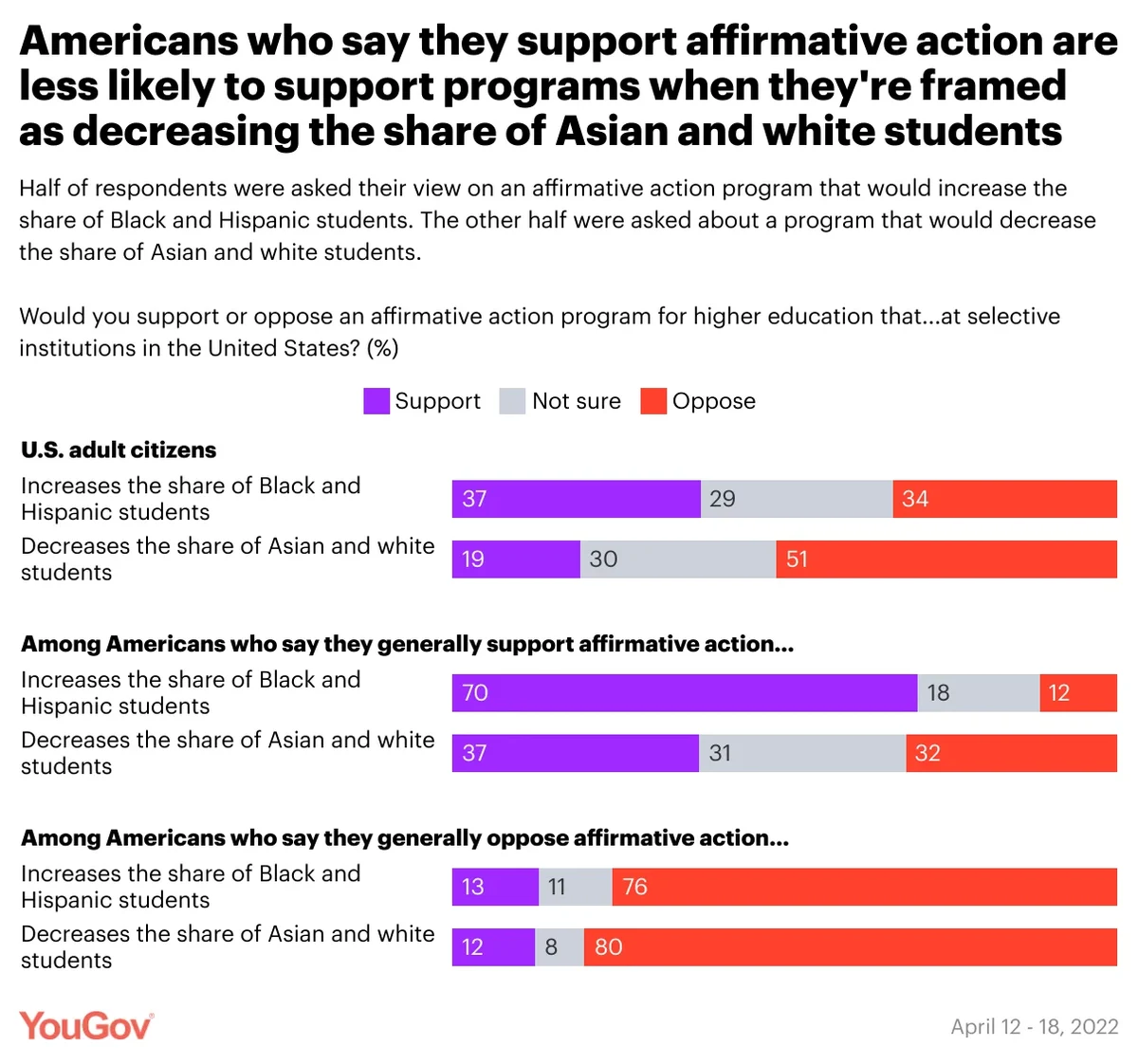
How important do Americans think different forms of diversity are when it comes to colleges? Americans are most likely to say racial diversity is very important, followed by socioeconomic diversity, gender diversity, ideological diversity, and political diversity. But the differences are small — for each form of diversity polled, between about one-quarter and one-third of Americans said it was “very important,” and between 50% and 60% said it was very or somewhat important.
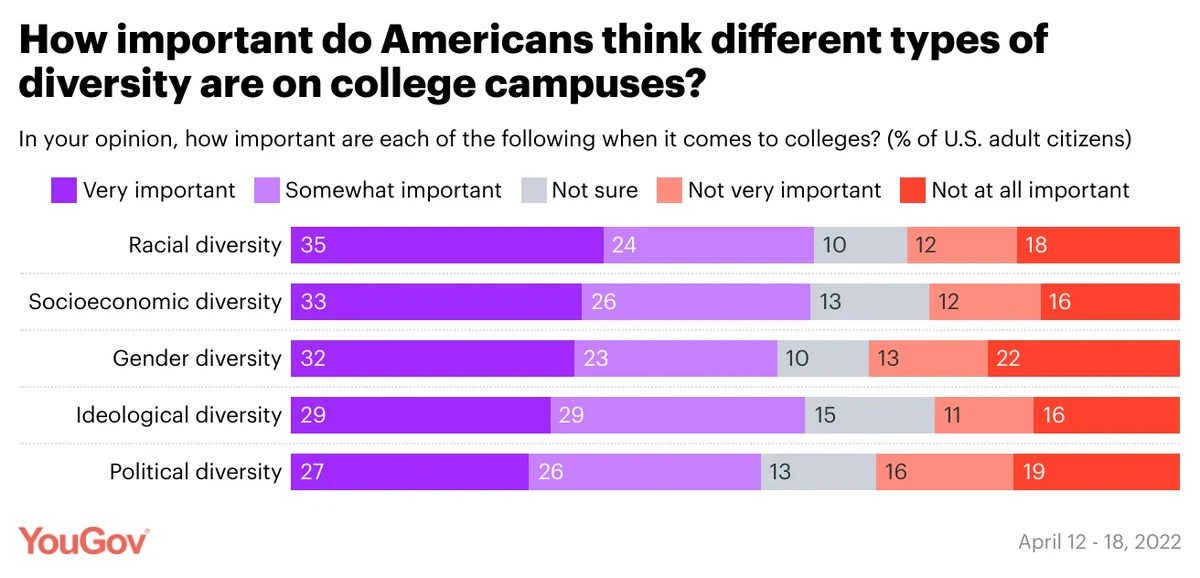
How do Americans think colleges should weigh different factors when deciding who to admit? Of the 11 factors asked about, grade point average (GPA) was ranked highest, followed by test scores, citizenship status, and extracurricular activities. Nearly two in three say race, ethnicity, and gender should not be considered at all. A similar share also opposes ever considering whether a student’s parents are faculty at the college or whether their parents or siblings attended the college — what’s often called legacy admissions.
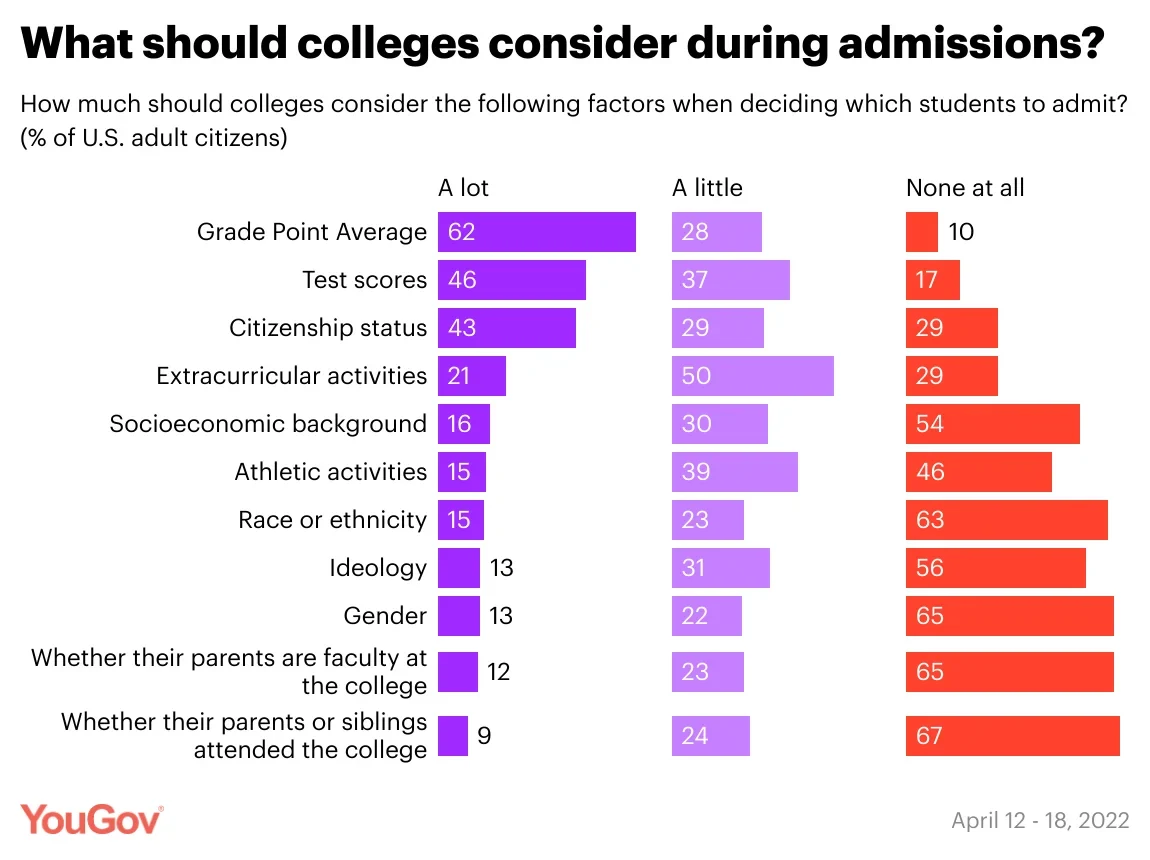
A 2017 analysis by The New York Times found that while Black Americans make up 15% of the college-age population, they only account for 6% of freshmen at 100 of the nation’s top universities. Hispanics make up 22% of the U.S. college-age population but account for only 13% of freshmen. Asian and white students, on the other hand, are overrepresented relative to their share of the population.
Which groups do Americans think are under and overrepresented on college campuses? There is much greater variation between races and ethnicities than between the genders. About two in five Americans say they think Black and Hispanic men and women are underrepresented relative to their share of the population, while one in five say they are equally represented; 12% say Black men and women are overrepresented and 8% say Hispanic men and women are overrepresented.
Americans are divided when it comes to their perceptions of the representation of Asian Americans; roughly an even share say Asian students are overrepresented and equally represented, while slightly fewer say they’re overrepresented. Only 12% say white men and women are overrepresented on college campuses, while at least twice as many say they are appropriately represented and a similar share say they are overrepresented.
Perceptions of the gender divide on college campuses appear to not have kept pace with reality. More Americans say that white men are overrepresented (36%) than say the same about white women (28%), and the shares are similar for men and women within other racial and ethnic groups. However, data from 2020 shows that just 41% of students enrolled in a postsecondary institution are men, while 59% are women.
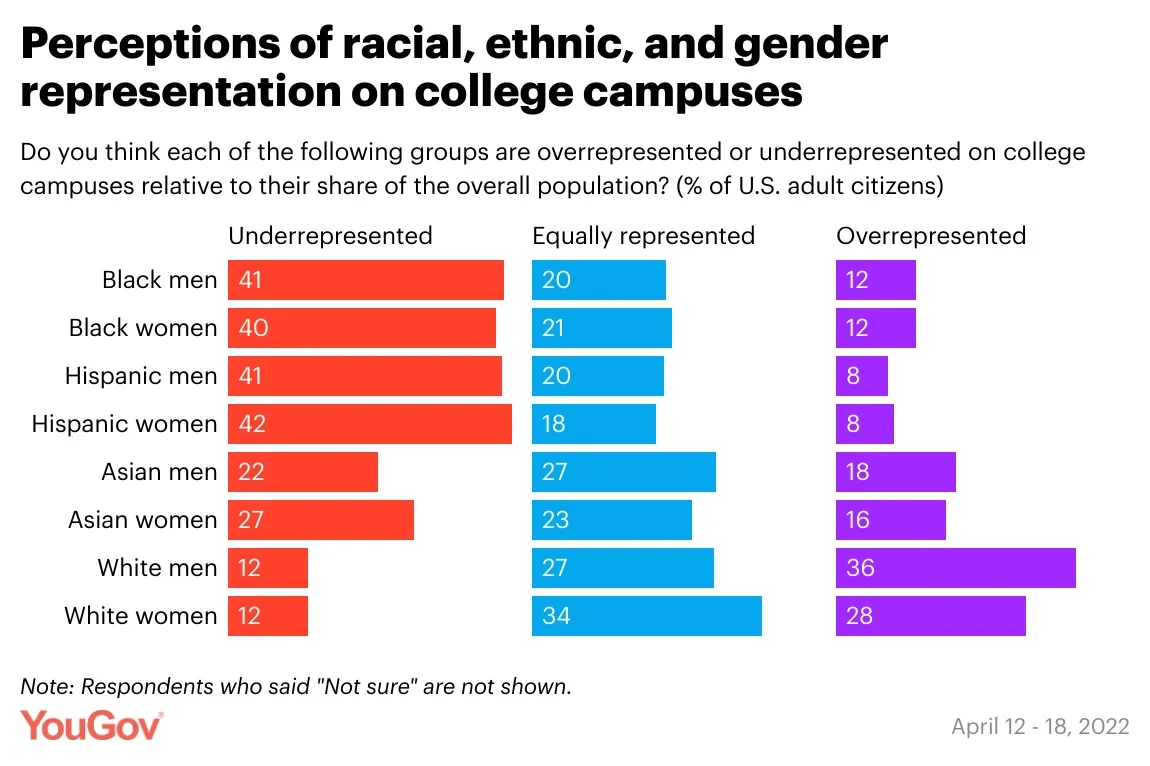
We also break these perceptions down by the race of respondents; the biggest differences appear to be that Black Americans are much less likely than white Americans to say white students are underrepresented, and much more likely to say Black students are:
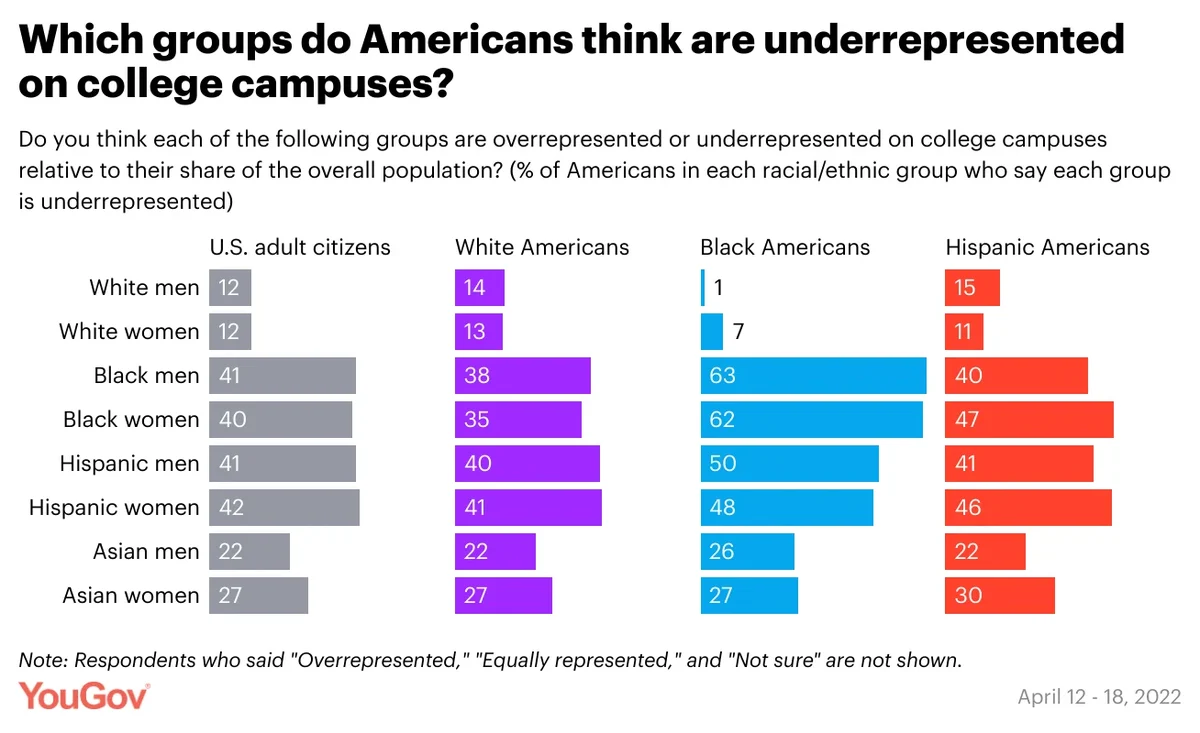
— Carl Bialik and Linley Sanders contributed to this article
This poll was conducted on April 12 - 18, 2022, among 1,500 U.S. adult citizens. Explore more on the methodology and data for this poll.
Image: Pexels










